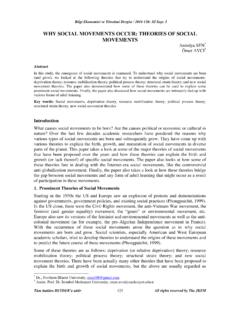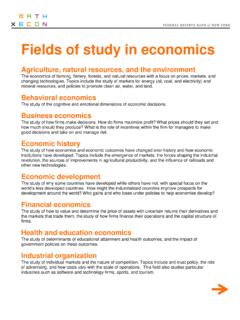Transcription of The Effect of Globalization on International Trade: The ...
1 88 International CONFERENCE ON EURASIAN ECONOMIES 2015 The Effect of Globalization on International Trade: The Black Sea Economic Cooperation Case Dr. Mesut Savrul ( anakkale Onsekiz Mart University, Turkey) Prof. Dr. Ahmet Incekara (Istanbul University, Turkey) Abstract Globalization including political, social and economic processes is frequently associated with multinational companies and investment, International trade and regionalism, global finance and money. While Globalization process reduced activity and control of national governments on their economy and trade their place is substituted by International companies.
2 The national economies on the other hand try to keep pace with the change in economic system by deregulating their International trade barriers via regional trade agreements and economic integrations. Based on the assumption that the Globalization has liberalized their infrastructure of trade, this study investigates the balance of trade in the member countries of The Black Sea Economic Cooperation Organization (BSEC). The data is collected from International trade database of UNCTAD and Globalization index of KOF Swiss Economic Institute.
3 The variables are evaluated using panel data analysis and the results have shown that Globalization has a significant impact on International trade and the Globalization process had a positive Effect on the liberalization of trade in the member countries of the BSEC. 1 Introduction One of the widespread definitions of Globalization takes it as an irreversible force, which is being imposed upon the world by some countries and institutions through which an increasingly free flow of ideas, people, goods, services, and capital leads to the integration of economies and societies (IMF, 2002).
4 Economic aspect of the phenomenon refers to the increasing interdependence of world economies as a result of the growing scale of cross-border trade of commodities and services, flow of International capital and wide and rapid spread of technologies. It reflects the continuing expansion and mutual integration of market frontiers, and is an irreversible trend for the economic development in the whole world at the turn of the millennium (Shangquan, 2000: 1). As an inevitable result of this process the global trade flows benefited from this process substantially.
5 According to the data from WTO merchandise exports grew more than 8% a year by 1950s. Although fluctuations and recession were experienced in this expansion period the increase went on to a degree and the average expansion of world merchandise exports averaged 6% by 2000s. Although the global figures seems appealing, individual performances of the countries aren t so clear because of the deepening in the Globalization process which resulted in national governments losing control over their economy and trade which they tried to keep pace with the change in economic system by deregulating their International trade barriers through regional trade agreements and economic integrations.
6 Regional integration includes a multitude of steps that increase the competitiveness of participating countries, not just preferential trade access and helps small and remote countries scale up supply capacity in regional production networks which in turn, allows these countries to access global markets (Deichmann and Gill, 2008: 45). However the consequences of the Globalization and joining free trade agreements or economic integration are varies from country to country due to their geographical position, the natural resources they have, their level of economic development, etc.
7 In this framework considering that it is formed completely by developing economies, how the Globalization process affected International trade performance of BSEC member states is questioned in this study. 2 Globalization and Trade A radical transformation of economic life is presented with the process of Globalization which resulted in the generalization of market economy, increase in production, circulation of information, products, people and capital, implementation of technical systems becomes more efficient (D ianu, 2009: 211). Nations are no longer self-sufficient in the global economy and they are included in trade at different levels to sell what they produce to obtain what they are in need.
8 The countries usually produce more efficiently in some economic sectors than its trade partners. As supported by conventional economic theory, eventually trade promotes economic efficiency and it can be concluded that the Globalization of production is contributing to the Globalization of trade (Rodrigue , 2006: 144). The increase and expansion of the globalisation process were the result of a number of factors. These include the advances in the liberalisation of world trade and capital movements, technological progress that implied a SESSION 5A: Trade and Growth 89 significant decrease in transport and communication and co-ordination costs.
9 The growing openness of developing and emerging market economies with special emphasis on large economies such as China and India and countries of Central and Eastern Europe is also reflected by the acceleration in globalisation process. The strong increases in both activity and International trade flows practiced the developing and emerging economies reflected this phenomenon to global level (Manteu 2008: 73-74). In the last period three trends in world economy can be mentioned to shape Globalization flows. The value of International trade has grown by a factor of 16 times since the late 1970s.
10 In this regards ongoing growth of International trade, both in absolute terms and in relation to global national income can be taken as the first trend. The growing role of multinational corporations is the next since they are taking the lead in International trade particularly in terms of the share of trade taking place within corporations. And the last is higher relative growth of trade in Pacific Asia as many economies developed an export-oriented development strategy that has been associated with imbalances in commercial relations (Rodrigue , 2013: 19).



